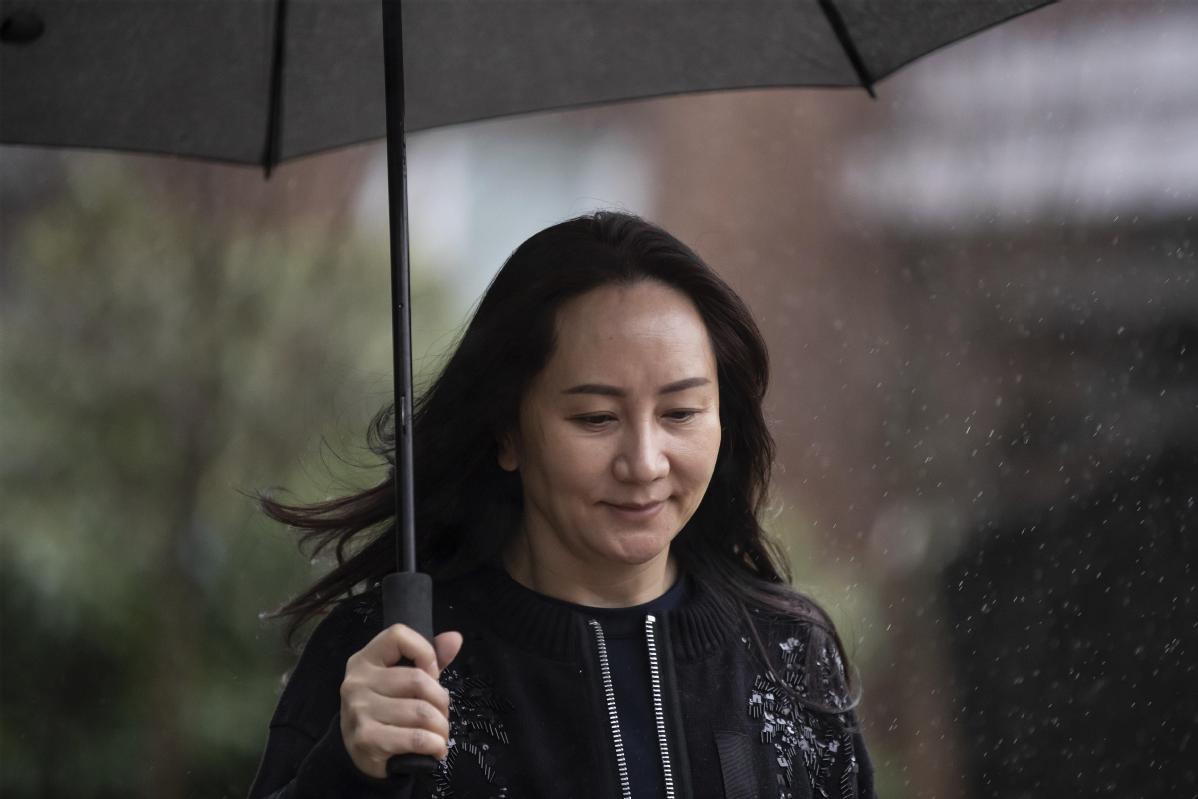Huawei CFO's husband wants her bail changed
chinadaily.com.cn | Updated: 2021-01-13 12:00

The husband of Huawei Technologies CFO Meng Wanzhou, who is seeking a change in her bail conditions, testified on her behalf Tuesday.
Meng, 48, must wear a tracking bracelet on her ankle while she is outside her home. The Chinese telecom giant's chief financial officer is currently confined to the Vancouver area outside of the airport zone and is subject to 24/7 monitoring.
Meng's husband, Liu Xiaozong, speaking in English with the aid of an interpreter, testified that she is at risk of contracting the coronavirus due to her being accompanied by numerous security officers whenever she leaves home, The Canadian Press reported.
Liu said his wife has high blood pressure and has survived thyroid cancer, while their daughter and her son fear being publicly identified during visits to Vancouver due to a private security presence.
Lawyers for Meng, who has been out on C$10 million ($7.9 million) bail, want her to be able to leave her house without her security detail and outside her curfew hours (11 pm-6 am).
"Allowing her to leave without her being in a vehicle or followed by Lionsgate Management (the security company) is the essence of our application," defense lawyer Bill Smart said.
The two-day hearing in Vancouver is being conducted by Justice William Ehrcke, the judge who set the current bail conditions in 2018.
Crown prosecutors object to the application.
"It is Canada's position that the conditions imposed on Ms Meng by the British Columbia Supreme Court at her initial bail application in December 2018 were necessary and appropriate, and there is no reason to vary the conditions at this time," officials said in the statement.
The main extradition hearing will resume March 1 in the court of British Columbia Superior Court Justice Heather Holmes.
Meng was arrested by Canada at the request of the US on Dec 1, 2018, at the Vancouver International Airport. She is accused of bank fraud for allegedly misleading HSBC to break US sanctions against Iran, which Meng and Huawei have denied.
As part of an abuse of process claim, Meng's lawyers have been arguing that her rights were violated when she was detained at the airport two years ago.
Joven Narwal, a criminal defense lawyer and the Canadian Bar Association (BC branch) spokesman on extradition issues said that the recent testimony of Royal Canadian Mounted Police (RCMP) and border services officers in Meng's case revealed a "total lack of consideration" for her Charter rights.
"Notwithstanding all of the allegations, I think that at the very least the defense is going to be able to establish that there's been a lack of consideration and perhaps a pattern of disregard entirely of Ms Meng's constitutional rights," Narwal told the Vancouver Sun.
"In so far as the various officers saying that this is routine, I think what has emerged is that there is a total lack of consideration for her Charter rights," Narwal continued.
He noted that the abuse argument also relates to the defense claiming that US President Donald Trump improperly asserted that he might intervene in the extradition process if he could get a better trade deal with China.
Narwal told the media that the defense case was a "multifaceted attack" on the conduct of the extradition proceedings and involves an "unlawful collaboration" between the Canadian and American authorities in collecting evidence against her.
The Wall Street Journal reported last month that the US was negotiating with Meng about a deferred prosecution agreement that would allow her to return to China if she admitted wrongdoing in exchange for future charges being dropped.
Gary Botting, a Vancouver-based extradition law expert, wrote in the National Post earlier this month that "if Meng admits to wrongdoing, she would have a criminal record and any number of countries (including Canada) could use this against her".
By citing three cases in which he was previously involved, Botting said the US "could be setting a trap" for Meng if she took the deal.
"Ultimately, Meng's name must be struck from the indictment," he wrote in the op-ed article. "Otherwise, even if Canada's minister of justice orders her to be discharged, the United States can go after her again and again, whenever she happens to land in a country with which the Americans have an extradition treaty."
In an article "Why Canada Should Finally Free Meng Wanzhou" published in The Walrus, the author said Meng's detention has always been political. With the Trump administration leaving office and President-elect Joe Biden's inauguration on Jan 20, Canadian Prime Minister Justin Trudeau shouldn't wait to release Meng, the article said.
Canada's government has been cautious to a fault when it comes to "not antagonizing" the Trump administration, but now, "with a new American administration incoming, our political leaders can use the opportunity to assess the Meng case from a new perspective: caught between two competing superpowers, freeing Meng may be the just thing to do", the article states.
Agencies contributed to this story.
























